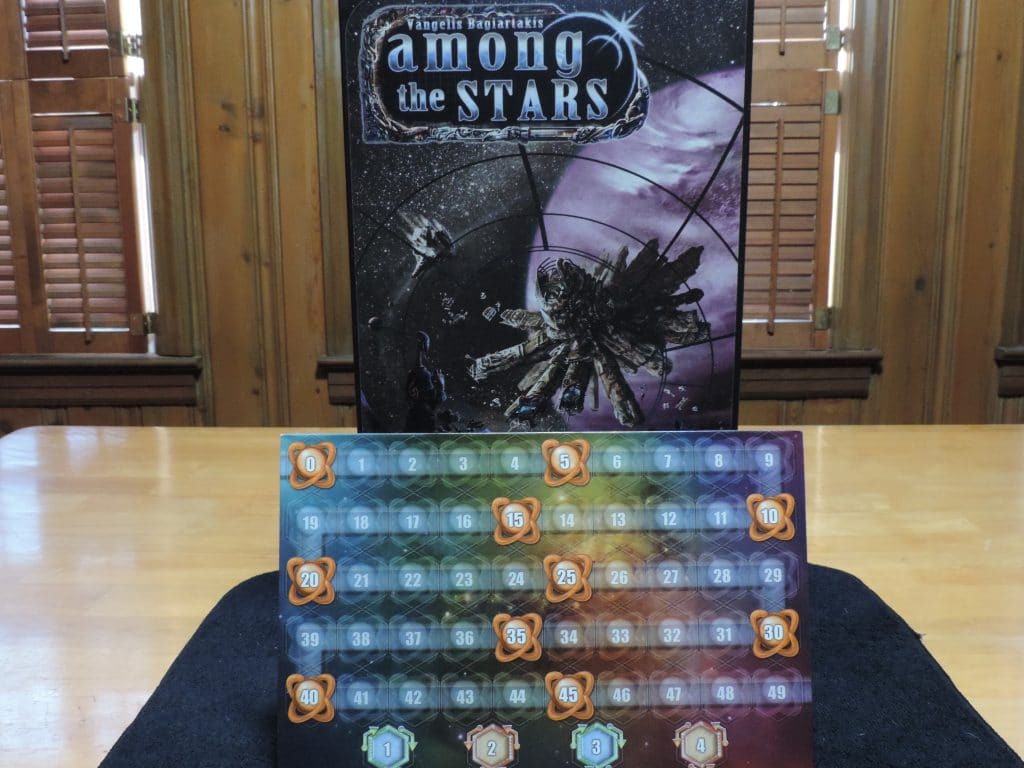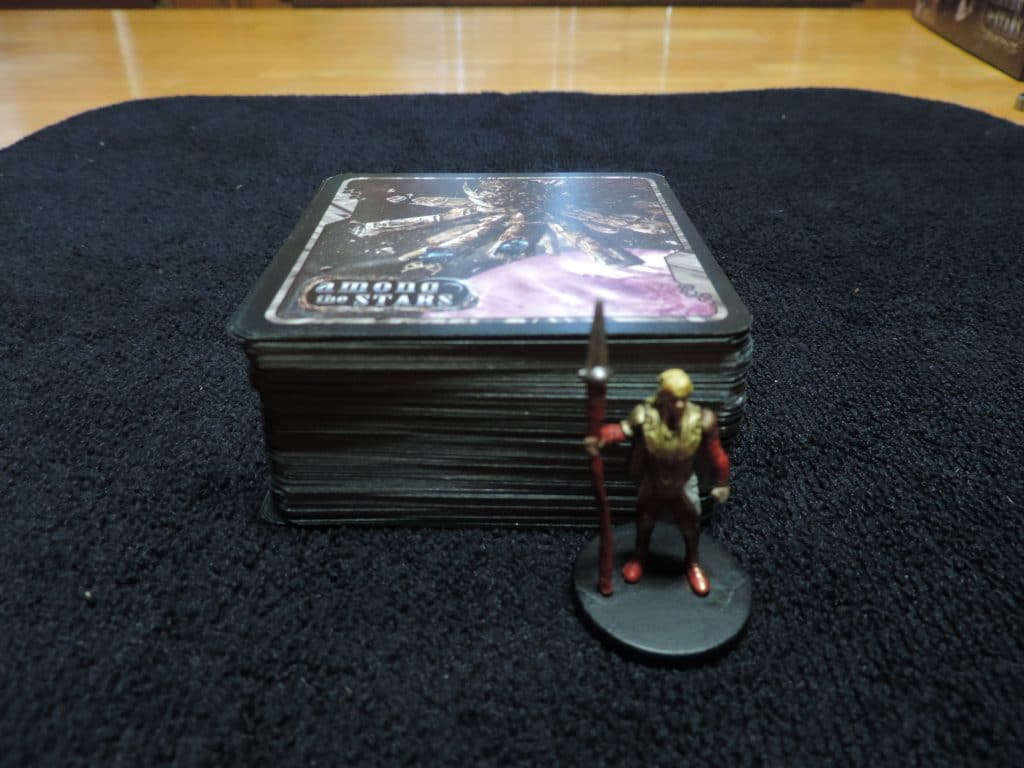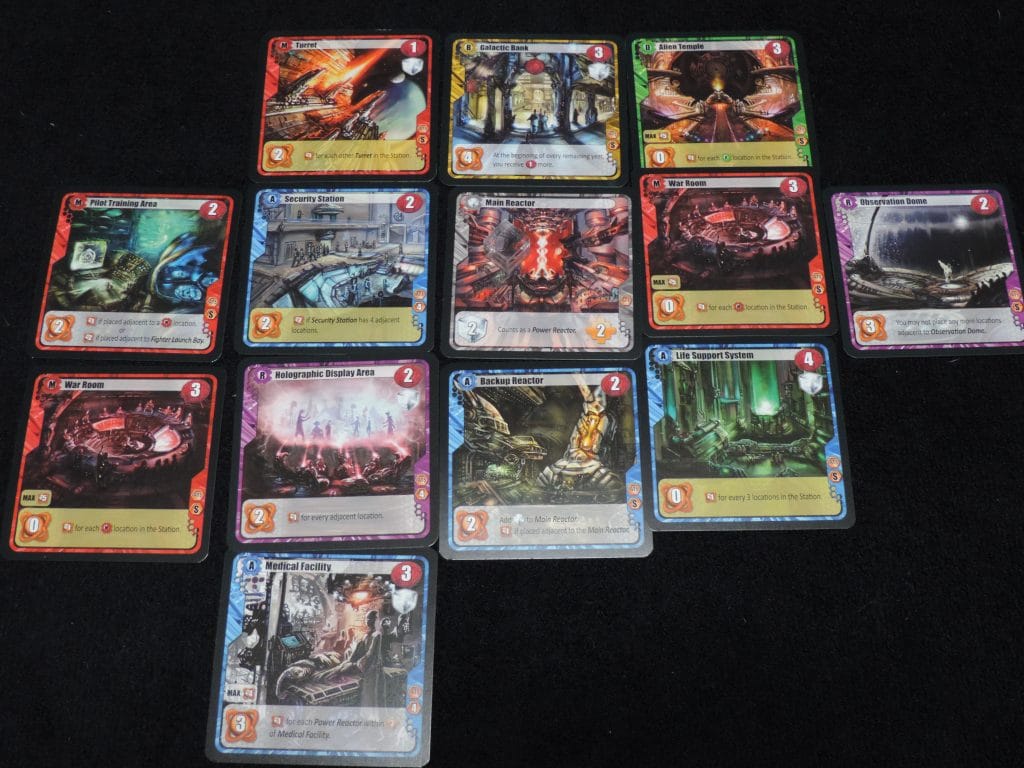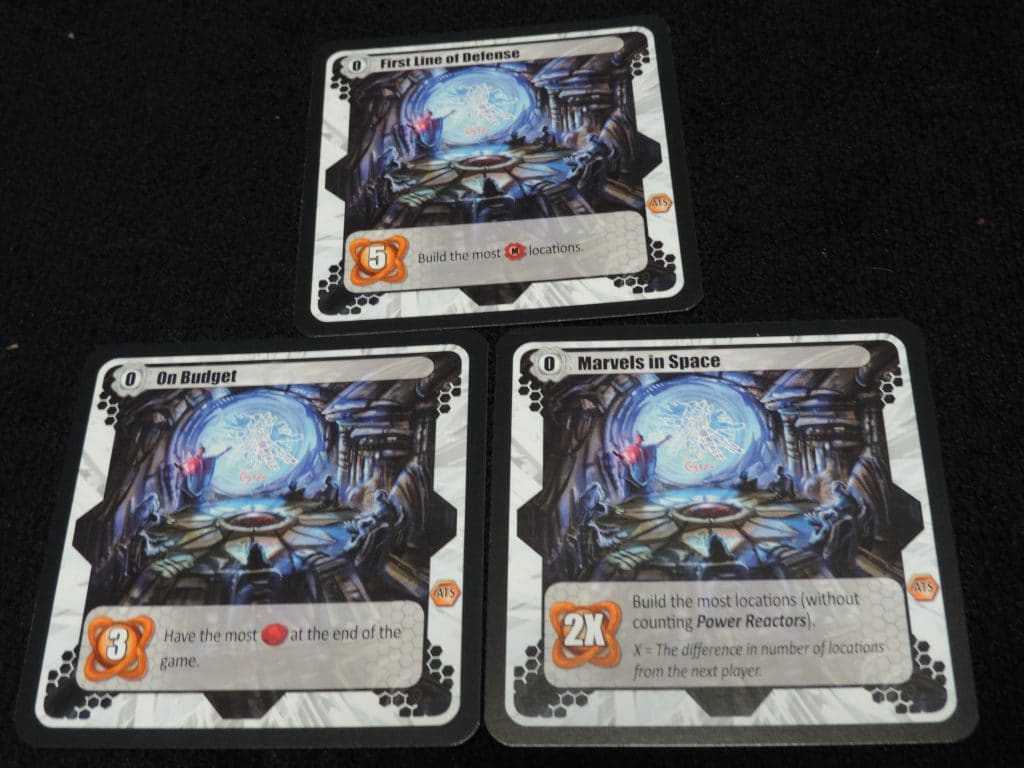A mounting intergalactic war that threatened to divide the cosmos and its alien races is unexpectedly halted; not by peace, but by utter annihilation. The forces of both the Garrn’Athak’Nok and the The Order were obliterated as they were drawing up battle lines by an unknown but devastatingly superior fleet that left just as quickly as it had arrived.
The Purge Incident, as it came to be known, scared the remaining major races into an alliance. They would need a physical symbol of this new union and new hope against the mysterious aggressors.
That’s where you come in.
Among the Stars: Some Assembly Required
In Among the Stars, you draw an alien race tile (each complete with a unique racial ability, of course) and compete against the other players to build the best darned space station you can. The construction takes place over the course of a four year period (read: four rounds), with each year consisting of six turns.
At the beginning of each year, every player draws a hand of six cards and adds ten credits to their resource pool, and each player begins their space station with a single Power Reactor and two energy cubes.
On their turn, a player can do only one of three things:
- Build a Location
All new Locations must be placed orthogonally (no diagonals!) to an existing Location, and are acquired by paying the Location’s cost. Most Location costs consist of credits only, but some require credits and energy – all of which is displayed in the top right of the cards.
- Build a Power Reactor
Energy cubes can only be used to purchase locations placed within a range of 2 cards (and again – diagonals don’t count!), so if you need energy beyond the reach of your Main Power Reactor, you can discard a card from your hand, pay 1 credit, and add an additional Power Reactor wherever you’d like on your station to facilitate future expansions.
- Discard a card and gain 3 credits
Alternatively, if funds are running low, you can discard a card to gain a few credits.
After the declared action is completed, the remaining cards in your hand are then passed to your neighbor, draft style, until every card has been either played or discarded–marking the end of that year.
Most cards award Victory Points upon purchase, but some feature VP values that are conditional and not calculated until the game’s end. You also draw a number of Objective cards that reward space stations with certain features with extra VP!
There are a couple of rules that govern Location placements on your space station (for instance, a card that reads you can have a Max of 1 of that type of card anywhere on your structure), and if they are violated and caught, you lose the VP those Locations afforded you and you don’t get a credit refund. So pay close attention, or you’ll definitely be sorer for the gaffe!
Among the Stars also comes with a sabotage option called Conflict cards (which I hear are expanded in the…um…expansions), as well as a couple of play variants. Being that this isn’t a new game, you can also find three of those expansions on the market right now which introduce all sorts of new mechanics:

A glance at the different art styles of the VP board and the rest of the game. ![]()
Space station starter set: 10 credits, Main Power Core, Alien Race. 
There are 120+ Location cards (Sun Elf Guard mini for scale!). ![]()
A few of the Objective cards. 
A well-built station!
Staking our C.L.A.I.M. on Among the Stars
 Components
Components
The cards you use to assemble your space station are square as opposed to rectangular, which both keeps things tight and makes your space station build in all directions equally (as opposed to being unavoidably taller than it is wide, for instance). Each of the cards features sci-fi inspired artwork and all of its information is clearly visible and easily read and understood.
The cardboard components are sturdy; particularly the alien race cards. There’s quite a bit less flair to the VP tracker board and player markers than the cards and box. They actually feel like a whole different aesthetic altogether–more on that below!
 Luck
Luck
There’s a bit of luck in the draw and the cards you’re passed, but on the flip side you retain a good deal of control over what you hand to your neighbor turn to turn. Could be that you can kill two birds with one stone by discarding a card for credits that would prove beneficial to your opponent–denying them a strong play and padding your bank.
Since credits and space stations remain visible throughout play, you should definitely be mindful of what options you might be creating for your opponents!
 Aesthetics
Aesthetics
There is a neat sci-fi theme to the whole game, obviously. The rulebook even contains a longer version of the intro narrative I provided above along with descriptions of the various races.
The player tokens and VP board feature a more bubbly and cartoony aesthetic than the line-heavy and detailed art of the rest of the components, which is weird, but not off-putting.
 Interest
Interest
Simple set up. Simple gameplay. Lots of expansions that increase the complexity if you so desire. I like the drafting mechanic a lot, and while the base game has plenty of options, the fact that I’m getting to Among the Stars (2012) kinda late and it already has a few expansions makes me happy. Not because the base game is dull; it isn’t! Just because I like having lots of options right out of the gate.
 Mood
Mood
I’ve had my gaming group grumbling about games before the first turn was taken due to the drudgery of reading through pages and pages of rules. Among the Stars can be taught in no time flat, which is always a plus. It also plays quickly at 30 minutes or less.
These kinda games are my group’s favorite spin up or wind down games. Not really a game we’d play over and over, back to back, but definitely something we’d play while we waited on a late arrival to the fun, as a cool down after a more complex and lengthy offering, or as an introduction to the draft mechanic to new players.
Among the Stars: Lost in Space?
Among the Stars plays and feels a lot like 7 Wonders; so much so that it is kinda mind boggling that Among the Stars is rated 477th all time on Board Game Geek while 7 Wonders is ranked 45th. There are definitely some differences between the two, but 432 spots worth of difference..?
This revelation sparked an interesting discussion between Nerds on Earth EIC Clave and me. Some of it has to do with marketing and the strength/size of publishers, surely. And Clave mentioned that BGG rankings tend to favor complexity over simplicity (7 Wonders has a bit more of the former than Among the Stars), but we’re curious…might be that we’ll research and report on this topic in the future, so stay tuned!
Until then, Among the Stars is a great game at the price point–around $30 on Amazon. It feels like a “small” game, but it is very well produced. It’ll definitely see some major play at my table–especially once I snag some of those expansions!



